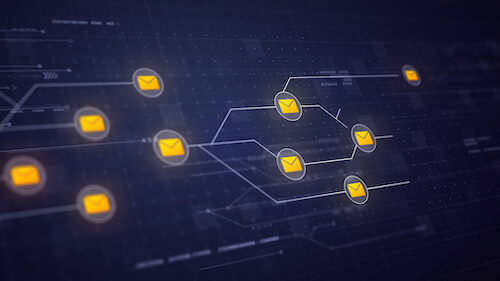Ensuring Compliance: The Importance of Email Archiving
Explore the importance of email archiving for business operations, system performance, data security, compliance, and cost reduction.
What is email archiving, and why should decision-makers in large organizations pay attention to it? To gain a deeper ...
What is email archiving, and why should decision-makers in large organizations pay attention to it? To gain a deeper understanding of email archiving, its advantages and drawbacks, as well as the different types of email archiving tools available on the market, we will explore how to effectively set up an archive system while providing insights into managing it efficiently.
After all, if your organization invests the time to implement email archiving solutions, managing it efficiently is the most critical next step.
After answering the question 'What is email archiving?', we'll also explore how various archiving solutions work by examining different types of systems available on the market.
Lastly, we'll highlight why getting an understanding of this topic is crucial for large businesses – from regulatory compliance requirements to improved efficiency and productivity as well as data security and protection. By grasping these concepts thoroughly, leaders like you can make informed decisions about implementing robust email storage management strategies within your organization.
Email archiving is a crucial aspect of modern business communication and email data management. It involves systematically storing, organizing, and preserving email messages for future reference or retrieval. Below we'll explore the definition, advantages and difficulties associated with email archives, and provides an overview of its role in modern businesses.
organizing, and preserving email messages for future reference or retrieval. Below we'll explore the definition, advantages and difficulties associated with email archives, and provides an overview of its role in modern businesses.
Email archiving refers to the practice of securely storing emails in a separate location from their original mailbox while maintaining their integrity and accessibility. This can be achieved through various methods such as on-premises storage solutions or cloud-based services. The primary goal behind email archiving is to ensure that important information contained within emails remains accessible over time.
There are several advantages to implementing an effective email archiving solution for large businesses, like yours:

While email archiving offers numerous benefits, there are also some challenges that need to be addressed when implementing an effective solution:
Business decision makers need to recognize the importance and benefits of saving emails securely for productivity as well as compliance purposes.
Email archiving is a process that involves the storage and management of electronic messages for future reference, retrieval, and compliance purposes. To understand the working of email archiving solutions, it is critical to look into the various kinds systems which are available, how to set a system to help prevent data loss and ingest historical data, and overseeing it efficiently.
There are various solutions on the market today that cater to businesses' needs. Some common types include:
Here is a high level list of steps to follow in order to setup email archiving for your organization:
Maintaining an efficient email archive requires ongoing management efforts by organizations' IT administrators. Some key aspects include:
Email archiving is an important tool for businesses of all sizes to ensure their data remains secure and compliant. It is critical that those in charge understand the email archiving systems available on the market, and how to correctly install and manage them so as to take advantage of them.
Business leaders need to understand why it's essential to keep emails, particularly where compliance and legal requirements are ever-changing.
Email archiving plays a crucial role in the operations of large businesses, helping them meet regulatory compliance requirements, improve efficiency and productivity, and enhance data security and protection. This section will explore the reasons why archive emails are a priority for those in charge of large organizations.
Large businesses often operate under strict legal and industry-specific regulations that mandate the proper storage and management of electronic communications such as emails. For instance, companies in the financial sector need to comply with regulations like SEC Rule 17a-4, while many healthcare organizations must adhere to HIPAA guidelines. Many organizations are also impacted by GDPR. Failure to maintain compliant email archives can result in hefty fines or even legal action against your organization.
Email archiving solutions help ensure that all relevant emails are securely stored according to regulatory requirements by automatically capturing incoming and outgoing messages along with their attachments. This not only helps prevent users accidentally deleting emails, but also facilitates easy retrieval during audits or investigations.
In today's fast-paced business environment, employees spend a significant amount of time managing their inbox and keeping their inbox clean - searching for specific emails or trying to free up storage space by deleting old messages manually can be both tedious and time-consuming tasks. An effective email archiving system eliminates these issues by:
This streamlined approach to email management allows employees to focus on more important tasks, ultimately boosting productivity and efficiency within your organization.

Organizations must take measures to ensure their sensitive data and personal data relating to users is secure from unauthorized access or tampering, particularly for larger businesses which are often targeted by cybercriminals. Email archiving solutions contribute significantly in this regard by:
In addition, a well-implemented email archiving system can also serve as an invaluable tool during disaster recovery scenarios - ensuring that some critical business communications remain accessible even if primary systems are compromised.
Taking into account these factors, it becomes evident that implementing an effective email archiving solution is crucial for large businesses seeking compliance with regulatory requirements while enhancing overall operational efficiency and safeguarding vital data assets.
This post has covered what is email archiving and how it is an essential tool for large businesses to ensure that all emails are securely stored and easily accessible. Organizations that take the time to understand email archiving can gain multiple advantages, such as increased compliance with regulations, higher security of confidential information and improved productivity. Email archiving provides a cost-effective way for companies to protect their valuable information while providing access when needed.
Take control of your emails now by investing in an email archiving solution!
Explore the importance of email archiving for business operations, system performance, data security, compliance, and cost reduction.
Explore the significance of an email archiving strategy for large organizations, ensuring compliance, storage optimization, and easy accessibility.
Ensure email compliance by managing and storing emails according to legal requirements. Learn about email compliance regulations with Cloudficient’s...